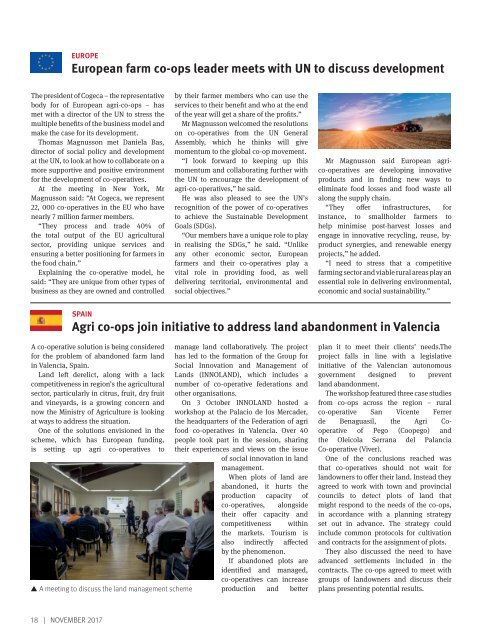November 2017
Create successful ePaper yourself
Turn your PDF publications into a flip-book with our unique Google optimized e-Paper software.
EUROPE<br />
European farm co-ops leader meets with UN to discuss development<br />
The president of Cogeca – the representative<br />
body for of European agri-co-ops – has<br />
met with a director of the UN to stress the<br />
multiple benefits of the business model and<br />
make the case for its development.<br />
Thomas Magnusson met Daniela Bas,<br />
director of social policy and development<br />
at the UN, to look at how to collaborate on a<br />
more supportive and positive environment<br />
for the development of co-operatives.<br />
At the meeting in New York, Mr<br />
Magnusson said: “At Cogeca, we represent<br />
22, 000 co-operatives in the EU who have<br />
nearly 7 million farmer members.<br />
“They process and trade 40% of<br />
the total output of the EU agricultural<br />
sector, providing unique services and<br />
ensuring a better positioning for farmers in<br />
the food chain.”<br />
Explaining the co-operative model, he<br />
said: “They are unique from other types of<br />
business as they are owned and controlled<br />
by their farmer members who can use the<br />
services to their benefit and who at the end<br />
of the year will get a share of the profits.”<br />
Mr Magnusson welcomed the resolutions<br />
on co-operatives from the UN General<br />
Assembly, which he thinks will give<br />
momentum to the global co-op movement.<br />
“I look forward to keeping up this<br />
momentum and collaborating further with<br />
the UN to encourage the development of<br />
agri-co-operatives,” he said.<br />
He was also pleased to see the UN’s<br />
recognition of the power of co-operatives<br />
to achieve the Sustainable Development<br />
Goals (SDGs).<br />
“Our members have a unique role to play<br />
in realising the SDGs,” he said. “Unlike<br />
any other economic sector, European<br />
farmers and their co-operatives play a<br />
vital role in providing food, as well<br />
delivering territorial, environmental and<br />
social objectives.”<br />
Mr Magnusson said European agrico-operatives<br />
are developing innovative<br />
products and in finding new ways to<br />
eliminate food losses and food waste all<br />
along the supply chain.<br />
“They offer infrastructures, for<br />
instance, to smallholder farmers to<br />
help minimise post-harvest losses and<br />
engage in innovative recycling, reuse, byproduct<br />
synergies, and renewable energy<br />
projects,” he added.<br />
“I need to stress that a competitive<br />
farming sector and viable rural areas play an<br />
essential role in delivering environmental,<br />
economic and social sustainability.”<br />
SPAIN<br />
Agri co-ops join initiative to address land abandonment in Valencia<br />
A co-operative solution is being considered<br />
for the problem of abandoned farm land<br />
in Valencia, Spain.<br />
Land left derelict, along with a lack<br />
competitiveness in region’s the agricultural<br />
sector, particularly in citrus, fruit, dry fruit<br />
and vineyards, is a growing concern and<br />
now the Ministry of Agriculture is looking<br />
at ways to address the situation.<br />
One of the solutions envisioned in the<br />
scheme, which has European funding,<br />
is setting up agri co-operatives to<br />
p A meeting to discuss the land management scheme<br />
manage land collaboratively. The project<br />
has led to the formation of the Group for<br />
Social Innovation and Management of<br />
Lands (INNOLAND), which includes a<br />
number of co-operative federations and<br />
other organisations.<br />
On 3 October INNOLAND hosted a<br />
workshop at the Palacio de los Mercader,<br />
the headquarters of the Federation of agri<br />
food co-operatives in Valencia. Over 40<br />
people took part in the session, sharing<br />
their experiences and views on the issue<br />
of social innovation in land<br />
management.<br />
When plots of land are<br />
abandoned, it hurts the<br />
production capacity of<br />
co-operatives, alongside<br />
their offer capacity and<br />
competitiveness within<br />
the markets. Tourism is<br />
also indirectly affected<br />
by the phenomenon.<br />
If abandoned plots are<br />
identified and managed,<br />
co-operatives can increase<br />
production and better<br />
plan it to meet their clients’ needs.The<br />
project falls in line with a legislative<br />
initiative of the Valencian autonomous<br />
government designed to prevent<br />
land abandonment.<br />
The workshop featured three case studies<br />
from co-ops across the region – rural<br />
co-operative San Vicente Ferrer<br />
de Benaguasil, the Agri Cooperative<br />
of Pego (Coopego) and<br />
the Oleícola Serrana del Palancia<br />
Co-operative (Viver).<br />
One of the conclusions reached was<br />
that co-operatives should not wait for<br />
landowners to offer their land. Instead they<br />
agreed to work with town and provincial<br />
councils to detect plots of land that<br />
might respond to the needs of the co-ops,<br />
in accordance with a planning strategy<br />
set out in advance. The strategy could<br />
include common protocols for cultivation<br />
and contracts for the assignment of plots.<br />
They also discussed the need to have<br />
advanced settlements included in the<br />
contracts. The co-ops agreed to meet with<br />
groups of landowners and discuss their<br />
plans presenting potential results.<br />
18 | NOVEMBER <strong>2017</strong>


















